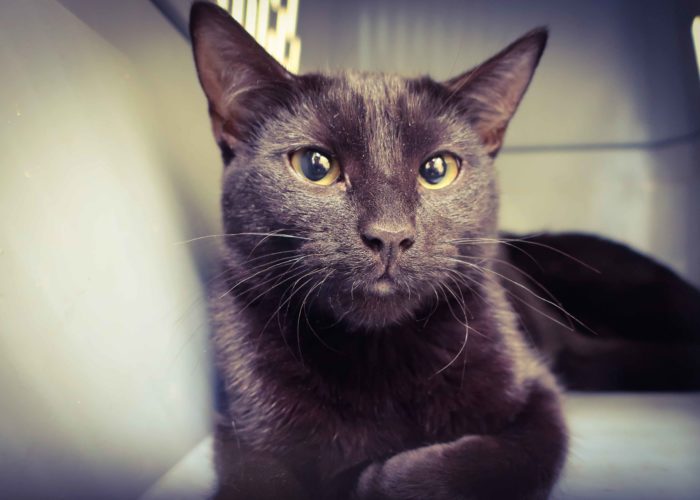 We know; your pets are your family. You want to share everything with them. But some things are off limits; certain human foods, for example. Today we’re going to take a look at some common foods that are off limits for your pets!
We know; your pets are your family. You want to share everything with them. But some things are off limits; certain human foods, for example. Today we’re going to take a look at some common foods that are off limits for your pets!
Chocolate
This is one that people often know and hear the most. Theobromine is a stimulant found in the cacao plant (where chocolate comes from); in pets it affects the kidneys, heart, and central nervous system. Because different types of chocolate contain different amounts of the cacao plant, the amount of theobromine in a piece of chocolate can vary a lot. White chocolate, for example, contains a very small amount because it actually has very little of the actual cacao plant in it; dark chocolate and baking chocolate contain the most.
If your pet ingests chocolate, you’ll begin to see theobromine poisoning symptoms within 4 to 24 hours. Depending on the amount ingested, symptoms could take the form of restlessness, seizures, vomiting, and diarrhea. There’s no chemical way to counteract the poisoning; your vet will most likely have to induce vomiting to get the chocolate out of your pet’s system.
Caffeine
Pets are way more sensitive to caffeine than humans. A lick or two of a caffeinated beverage isn’t going to kill them, but the ingestion of coffee grounds or tea bags can be a serious problem. The signs are very similar to chocolate poisoning.
Alcohol
Under no circumstances should you give your pet alcohol. Apart from alcohol poisoning from the ethanol in alcoholic beverages, as well as the intestinal distress that can be caused by carbonation, hops (which is used to brew beer) can be lethal to pets, though the exact nature of that poisoning is still not completely understood. Symptoms of alcohol poisoning can range from vomiting and disorientation, to loss of consciousness, seizures, slow heart rate, and breathing problems. If your pet needs to be your drinking buddy, there are plenty of pet-friendly, non-alcoholic options for you, like KC’s own Beer Paws.
Salt
As a society, we love salt; it’s essential in a modern kitchen. But too much salt for our pets is no good at all. Too much salt leads to excessive thirst and urination, or even sodium ion poisoning. It can also lead to diarrhea, vomiting, increased body temperature, seizures, and in some cases, death. So keep your pets away from your chips and other salty snacks.
Bread Dough
Raw bread dough rises and expands before it’s baked, and that’s exactly what makes it dangerous for your pet. If your pet ingests unbaked bread dough, that expansion of the dough still continues; this means danger for your pet’s intestinal system. The gases can cause intense intestinal distress, and yeast give off ethanol as a by-product, which can actually give your pet alcohol poisoning.
Grapes and Raisins
It isn’t known exactly what makes grapes and raisins toxic to pets, but the effect they have is deadly. It doesn’t seem to matter if they’re seedless, green, red, store-bought or home-grown, the result is still the same. Vomiting and diarrhea are the first symptoms, but the end result is often renal (kidney) failure.
Alliums (Onion, Garlic, Leek, etc)
Allium refers to a specific genus of flowering plant. Onions, garlic, leeks, shallots, chives, and scallions are all part of this family of plants. The short version of the story is that they impair your pet’s ability to carry oxygen through the bloodstream. This can lead to symptoms like difficulty breathing, lethargy, vomiting and diarrhea, pale gums, an elevated heart rate, and collapse. There can be a lag of 2 to 4 days between when your pet ingests one of these plants and when they start to show symptoms.
The long version is that when your pet chews the plant, organosulfur compounds in the plant are metabolized into reactive oxidants that break down red blood cells, bonding with the hemoglobin from the cells to form sulfhemoglobin, which then binds with red blood cells to create what are called Heinz bodies. In addition, some of the loose hemoglobin becomes cross-linked and forms special cells called eccentrocytes, which further destabilize the red blood cells and impair your pet’s ability to carry oxygen through its body. That’s when you start seeing the symptoms.
Milk / Dairy
Despite the old trope of giving a kitten a saucer of milk, cats (and many dogs) actually aren’t always able to digest milk properly. Just like in humans, this is what we call lactose intolerance; it means they don’t have enough of the enzyme lactase in their bodies to break down the lactose. This causes severe intestinal distress, pain, and diarrhea in pets the same way it does in humans. Cats are lactose intolerant; dogs are often lactose intolerant, but not always. It’s best to play it safe where dairy is concerned; if you decide to try any dairy product with your dog, it’s best to choose something with the lowest amount of lactose possible (since not all dairy products contain the same amount). The intestinal distress caused by dairy products isn’t usually life-threatening, but it is extremely painful and uncomfortable for them.
Xylitol
In its chemically-extracted form, xylitol has become very popular as an artificial sweetener. Sugar-free gums and candies are full of the stuff. It’s definitely better than sugar when it comes to trying to avoid cavities (as the bacteria in your mouth can’t convert it to acids that damage teeth), and it’s great as an artificial sweetener for diabetics, because of the way human bodies process it differently from sugar.
Dogs, though, process it exactly the same as regular sugar, which means it causes a sudden release of insulin, resulting in hypoglycemia (low blood sugar). Indications that your dog may have swallowed something containing xylitol are a sudden lack of coordination, vomiting, and lethargy. As symptoms progress your dog may have seizures and could end up comatose. There have been anecdotal stories of cats having the same reaction, but clinical research suggests that this isn’t the case. Plus, cats tend to avoid sweets, so it isn’t as much of a risk with them. But don’t chance it!
Sorbitol, another artificial sweetener, isn’t considered dangerous to pets, and some pet toothpastes actually use sorbitol as their main sweetener, so don’t be confused!
Macadamia Nuts
This is another one of those mystery ones where we just don’t know exactly what it is in macadamia nuts that’s toxic to dogs. The other mystery about this one, unfortunately, is that there’s no data available for their effect on cats. Best to steer clear. Consumption of macadamia nuts by dogs isn’t generally fatal, but symptoms include weakness, depression, vomiting, loss of motor control, tremors, and/or hyperthermia, so it’s best not to mess around.
Avocado
This is a tricky one. Avocado shows up on great number of lists like this, so we feel compelled to include it. But there’s some debate. This I Heart Dogs article gets to the heart of it if you want to read the whole saga. Essentially, the common understanding is that a chemical called persin, found in the bark and leaves of the avocado tree, as well as the peel and pit of the avocado fruit, is considered mildly toxic to domestic pets, and can cause serious problems in other animals like horses. This has put avocados on the “no-no” list for a number of decades. However, the actual level of toxicity for dogs and cats isn’t such that the actual flesh of the avocado should be immediately off-limits. The pet food brand AvoDerm has avocado or avocado oil in its foods, and they’ve experienced no problems with toxicity. They also test their food for traces of persin (because why take chances). The ASPCA (via the I Heart Dogs article linked above) said that they find mostly that avocado causes a mild stomach upset in domestic pets, but that the biggest danger for them is ingesting the pit, which, apart from having higher levels of persin than the flesh, can also become an obstruction in their digestive system.
So, while avocado may be okay in moderation, but keep your pets away from the pit, the peel, and parts of the avocado tree itself. But on a separate note, even if your pet has no problems with avocados, they’re best doled out in moderation, as they’re high in “good” fat, but too much of rich foods like avocados can lead to pancreatitis in cats and dogs.
A Word About Fruit
With most fruit, the pit or seeds are the biggest problems. Peaches, plums, and cherries are all fruits whose pits contain cyanide, so keep them away from your pet at all costs. Apple seeds, likewise, contain arsenic. And apart from any chemical danger the seeds and pits might cause your pet, they can also cause intestinal blockage, so let’s just avoid them altogether. Anything that’s not the flesh of the fruit should not be ingested. Also, consider that our pets don’t have quite the same nutritional requirements as humans, so while there are benefits to healthier snacks for you pet, dogs and cats are carnivores, so fruits and vegetables aren’t an essential part of their natural diet. If you want a nice, full list of fruits and veggies and whether they’re safe, this site has you covered.

